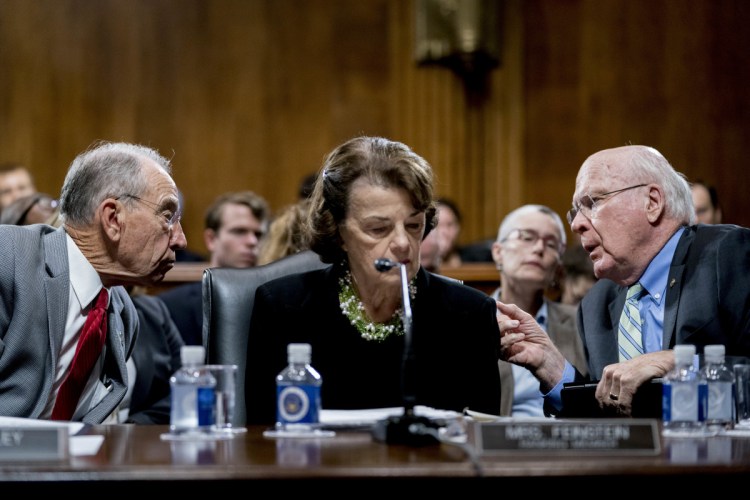WASHINGTON – Sen. Dianne Feinstein, the top Democrat on the Senate Judiciary Committee, said Thursday she has notified federal investigators about information she received – and won’t disclose publicly – concerning Supreme Court nominee Brett Kavanaugh.
The California Democrat said in a statement that she “received information from an individual concerning the nomination.” She said the person “strongly requested confidentiality, declined to come forward or press the matter further, and I have honored that decision.”
The Judiciary Committee, which has finished confirmation hearings for Kavanagh, is scheduled to vote Sept. 20 on whether to recommend that Kavanaugh’s nomination be confirmed by the full Senate.
Feinstein’s statement that she has “referred the matter to federal investigative authorities” jolted Capitol Hill and threatens to disrupt what has been a steady path toward confirmation for Kavanaugh by Republicans eager to see the conservative judge on the court.
An FBI spokeswoman declined to comment.
Feinstein declined to answer questions outside the hearing room, and other senators’ offices largely deferred to the ranking member. Democratic senators on the panel met privately Wednesday evening and discussed the information, according to two Senate aides who were not authorized to discuss the situation publicly but spoke on condition of anonymity.
The White House questioned the timing of Feinstein’s move, calling it an “11th hour attempt to delay his confirmation.”
“Throughout his confirmation process, Judge Kavanaugh has had 65 meetings with senators – including with Senator Feinstein – sat through over 30 hours of testimony, addressed over 2,000 questions in a public setting and additional questions in a confidential session. Not until the eve of his confirmation has Sen. Feinstein or anyone raised the specter of new ‘information’ about him,” said Kerri Kupec, a White House spokesperson.

Brett Kavanaugh on the third day of his Senate Judiciary Committee confirmation hearing.
Kupec added that the FBI has vetted Kavanaugh “thoroughly and repeatedly” during his career in government and the judiciary.
Democrats don’t have the votes to block Kavanaugh’s nomination, if Republicans hold unified, but are fighting it and decrying the process that Republicans used to compile his government records for review.
At the committee Thursday, Republicans brushed aside a flurry of Democratic attempts to delay the consideration of Kavanaugh or subpoena more documents about his past work, sticking with a schedule that could see him confirmed by Oct. 1.
Democratic Sen. Richard Blumenthal of Connecticut protested that the nomination will be “tainted” and “stained” by the unusual process for vetting the nominee.
“We lack the time. We lack the documents.” He called it a “badly broken process.”
Feinstein had sought a subpoena for documents from Kavanaugh’s time as Bush’s staff secretary. She said senators “should be able to see this record” and wondered, “What in Judge Kavanaugh’s records are Republicans hiding?”
The Republicans have declined to pursue Kavanaugh’s staff secretary documents, saying it would be too cumbersome. They rejected Feinstein’s motion and several others, including motions to subpoena documents and witnesses and a motion to adjourn.
Chairman Chuck Grassley set the panel’s vote on Kavanaugh for Sept. 20.
New documents released ahead of Thursday’s hearing included Kavanaugh’s 263-page written response to questions from senators, along with dozens of files from the judge’s work in the George W. Bush White House that had been available to senators only on a “committee confidential basis.” Democratic Sen. Cory Booker of New Jersey made the Bush documents public.
Among the details in the new written responses, Kavanaugh says he would have shaken the hand of a school shooting victim’s father during a break in last week’s Senate hearing had he recognized him before being whisked away by security detail.
The 28 new “committee confidential” documents released by Booker, meanwhile, are from Kavanaugh’s time in the White House counsel’s office during the George W. Bush administration and deal with his work on judicial nominations.
The documents show Kavanaugh’s involvement in Bush’s nomination of Charles Pickering to an appellate court in the South as Pickering faced questions about his views on race relations. Kavanaugh had indicated in 2006 testimony that he was not substantially involved in the nomination.
In releasing a new batch of committee confidential documents about Kavanaugh, Booker, the New Jersey Democrat, was repeating a tactic that could prompt a review from the Senate Ethics Committee.
Booker is being criticized by his Republican colleagues and outside groups for releasing the documents. Last week, he released some documents that were later made public by the committee, but also others that weren’t. Wednesday’s disclosure brings the total to 75.
The conservative group Judicial Watch delivered a letter Wednesday to the Senate Ethics Committee seeking an investigation. It says Booker violated Senate rules against disclosing confidential documents and could face Senate expulsion.
Booker has welcomed the fight. He says the documents about Kavanaugh’s work “raise more serious and concerning questions” about his honesty during his testimony before the committee.
At issue has been the unprecedented process the Senate Judiciary Committee used for gathering documents on Kavanaugh, an appellate court judge who is President Donald Trump’s nominee to replace retired Justice Anthony Kennedy on the court.
Associated Press writer Eric Tucker in Washington contributed to this report.
Send questions/comments to the editors.



Comments are no longer available on this story